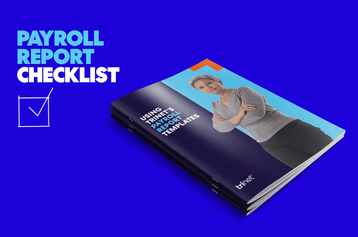
Table of contents
- 1.Frequently Asked Questions About Tip Credits
- 2.What Is a Tip Credit?
- 3.What Is the Maximum Tip Credit Allowed?
- 4.What if my employees earn more tips than what’s needed to bring their pay up to minimum wage? Can I keep the remaining tips?
- 5.I heard that there was a new law regarding tip pooling when the employer already pays the tipped employee the full minimum wage. What is that about?
- 6.What about the FICA Tip Tax Credit for Employers?
- 7.How do I report the FICA Tip Tax Credit?
Restaurant servers, hairdressers, taxi drivers-- more than 3 million Americans work a tipped job. And because part of their pay comes from tips, the federal government allows the employers of tipped workers to pay them less than the standard minimum wage.
The federal minimum wage for tipped employees is $2.13 per hour, compared to $7.25 per hour for other employees. States are also allowed to set their own minimum wage and tipped minimum wage, and in fact, many have minimums that are higher than those of the federal government.
So does this mean that tipped employees are not entitled to be paid at least the minimum wage for an hour’s work? Not exactly. What it means is this: employers are allowed to count an employee’s tips toward their minimum wage obligations. In doing so, employers are using something called a “tip credit.”
But what is a tip credit, how does it work, and how do employers ensure that they are following the law? Let’s take a look at some frequently asked questions about tip credits.
Frequently Asked Questions About Tip Credits
What Is a Tip Credit?
As we mentioned above, the Fair Labor Standards Act (FLSA) allows employers to pay their employees less than the standard minimum wage as long as the employee earns enough tips to make up the difference. That difference--the amount of money between the cash you pay your employees and the standard minimum wage--is called a tip credit. So for a tipped employee, minimum wage ends up looking like this:
(Tipped minimum wage) + (Tip credit) = (Standard minimum wage)
What Is the Maximum Tip Credit Allowed?
Each state sets its own minimum wage, tipped minimum wage, and maximum tip credit:
(Source: US Dept. of Labor, Minimum Wages for Tipped Employees, and MD Dept. of Labor, Licencing and Regulation, Allowable Tip Credits for Employees Earning Minimum Wage. Updated 1/2018)
" alt="why tip credit matters so much">
What if my employees earn more tips than what’s needed to bring their pay up to minimum wage? Can I keep the remaining tips?
According to the FLSA, your employees have the right to retain all of their tips, and employers may not take them for any reason other than a legitimate tip pooling process. (Legitimate tip pooling is only among employees who regularly receive tips and serve customers, like servers tipping out the bartender or hairdressers tipping out the shampooer.) Even if you pay your employees the full minimum wage, you still can’t force your employees to turn over their tips.
I heard that there was a new law regarding tip pooling when the employer already pays the tipped employee the full minimum wage. What is that about?
There was a lot of confusion last year and early this year regarding this issue. There were two federal lawsuits in which tipped employees claimed that their employers illegally took their tips. The employers claimed they had that right because the employees received the full minimum wage. The cases were heard in the 9th and 10th Federal Circuits, and they had conflicting rulings.
The 10th circuit ruled that employers did have the right to keep employee tips for the purpose of tip pooling with “back of the house” employees, like cooks and dishwashers. That ruling went against the provisions of the FLSA. The 9th circuit ruled that employers did not have this right.
The Department of Labor then challenged the 9th circuit decision in the Supreme Court. However, SCOTUS left the matter unresolved by denying the DOL’s petition without comment. But according to the Department of Labor’s website, although it is still illegal for employers to keep employee tips, they will not enforce this rule if the employer pays the employee the full minimum wage and doesn’t claim a tip credit.
What about the FICA Tip Tax Credit for Employers?
Here’s where it gets a little bit confusing. There are actually two federal rules with very similar names, and they both apply to businesses who employ tipped workers. So far, we’ve been talking about the FLSA Tip Credit. But there’s also something called the FICA Tip Tax Credit, and it could save you thousands of dollars each year.
To be clear, the FICA Tip Tax Credit is only available to employers in the food and beverage industry. If your employee tipped workers in another industry, that means you can’t claim this credit. Here’s how it works: a food and beverage employer might be able to get a partial tax credit equaling the employer’s portion of the FICA tax on tip income that exceeds the federal minimum wage.
In other words, you have to pay the employer matching FICA taxes on your employees’ tip income up to the federal minimum wage. But your share of the FICA taxes on any tips your employees earn above the minimum wage would then be eligible for the Tip Tax Credit.
The current FICA tax rate, including Medicare, is 7.65%. That can add up to thousands of dollars per year for most restaurant owners.
How do I report the FICA Tip Tax Credit?
You should complete IRS Form 8846 when you do your business tax return.
This article is for informational purposes and is not meant to provide legal, regulatory, accounting, or tax advice.

Nicole Roder
Table of contents
- 1.Frequently Asked Questions About Tip Credits
- 2.What Is a Tip Credit?
- 3.What Is the Maximum Tip Credit Allowed?
- 4.What if my employees earn more tips than what’s needed to bring their pay up to minimum wage? Can I keep the remaining tips?
- 5.I heard that there was a new law regarding tip pooling when the employer already pays the tipped employee the full minimum wage. What is that about?
- 6.What about the FICA Tip Tax Credit for Employers?
- 7.How do I report the FICA Tip Tax Credit?






